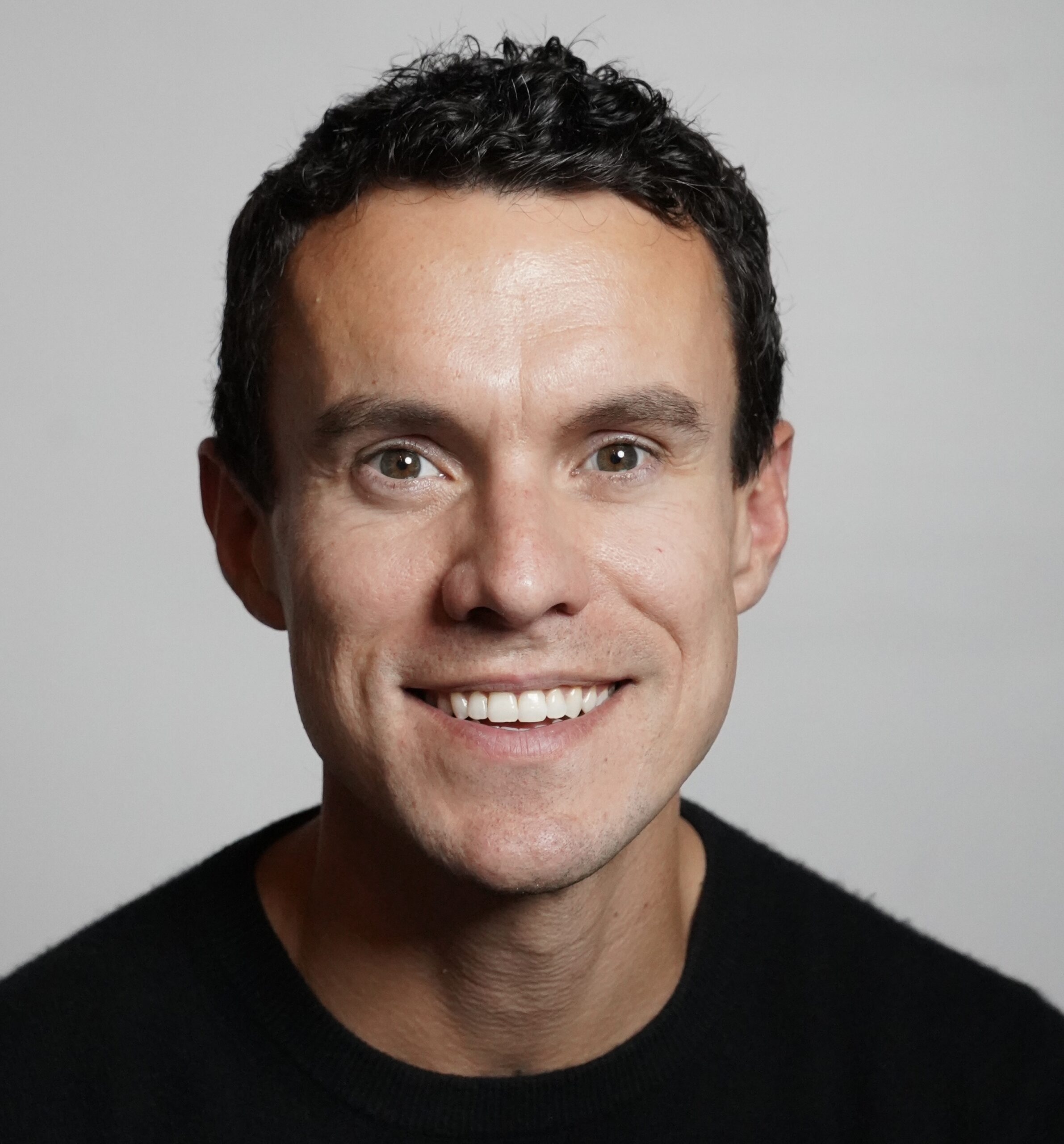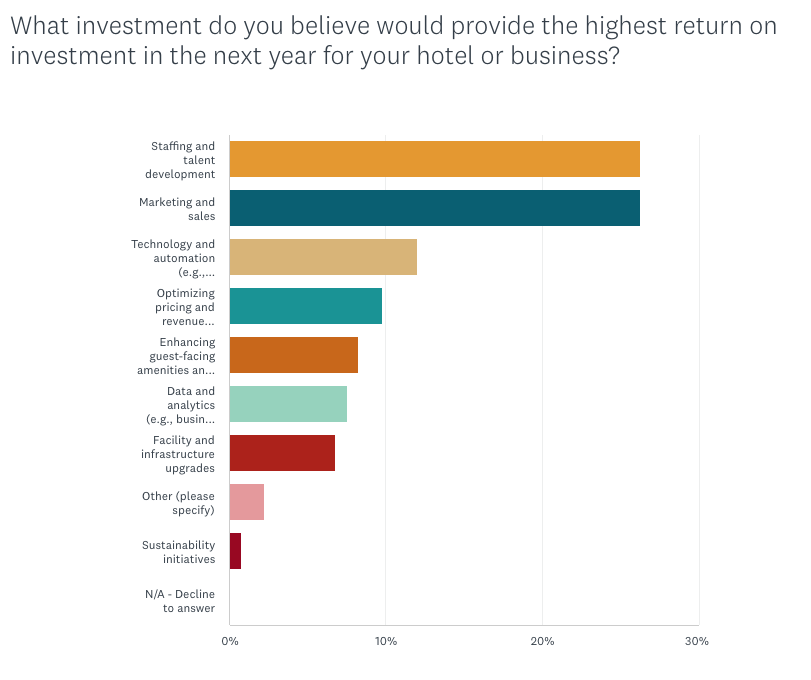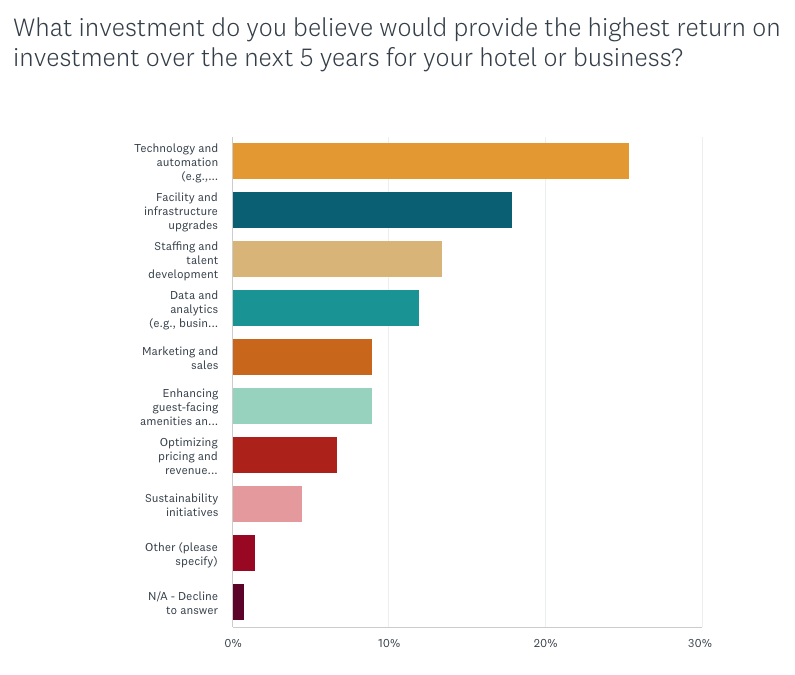
by Josiah Mackenzie
Founder & Publisher, HotelOperations.com
In addition to being the founder and publisher of this website, Josiah is also the Principal of Benchmark Research Partners and the Host of Hospitality Daily Podcast, from which he drew insights and observations for this article.
What’s happening in the hotel industry now in 2025?
To find out, I launched a research project through my firm, Benchmark Research Partners. We surveyed hundreds of people across the hotel industry – from owners, investors, and asset managers to brands, management companies, and on-property teams. I wanted to understand their biggest challenges today, but also what opportunities have them excited about the future.
In this article, I’ll share the biggest takeaways from this research with you. We’ll go through what we found in the data, and then I’ll show you some real-world examples from conversations I’ve had with hotel leaders on the Hospitality Daily Podcast about putting these ideas into action.
Before we get into the research, a bit of context on where hotels are in 2025.
“As an industry, we’re at a really unique inflection point.”
Zach Demuth, Global Head of Hotels Research at JLL, on Hospitality Daily
Hotel operators today are walking a tightrope. On one side, they’re dealing with intense pressure on profits from the rising costs to run their businesses. On the other, they’re seeing exciting possibilities through innovation.
Some challenges feel familiar – we’ve been talking about costs and changing guest expectations since before the pandemic. But there’s good news, too: new business models and advancing technology are opening doors to growth that weren’t there before.
Let me show you what our research revealed about this.
Data: Financial pressures are the biggest challenge for hotels in 2025
When we asked hoteliers about their biggest day-to-day challenge, one thing stood out: making money.

It’s not just about bringing in revenue – it’s about keeping enough of it after all the costs of running a hotel.
Data: Hoteliers are most excited about guest experience innovation in 2025
When asked what aspect of hospitality excites them most, the hoteliers participating in the study most frequently said “innovating in guest experience delivery”:

When you look at these two findings together – the biggest challenge and what gets hoteliers most excited – it reveals a clear theme:
Hotel leaders in 2025 will focus on driving profits through better guest experiences
People and the organizations they lead are always motivated by two things – what pain they’re driven to fix and what they want to move toward because they see the potential there.
For hotels in 2025, this means tackling profitability challenges by focusing on what gets hoteliers excited: creating better guest experiences.
When you innovate to make guest experiences better, you kick off this amazing chain of events. First, delighted guests become truly loyal to your hotel. They start booking directly with you instead of through other websites, which means you’re paying less in commission fees and making more profit. But it gets even better – these happy guests don’t just come back, they tell their friends about you. That word-of-mouth marketing? It’s the best kind because it’s free and people actually trust it.
Let’s explore this more with an example….
Case study: The hotel commercial leader who focused on operations and guest experience to drive hotel financial performance
Adele Gutman led sales, marketing, and revenue for her hotel group and knew that exceptional guest experiences drive revenue. She gave her team the freedom to do whatever it took to make guests happy.
The result? Her hotels consistently ranked at the top of guest satisfaction scoreboards – she even had multiple properties make TripAdvisor’s global “best hotels” list.
Here’s how Adele explained her thinking to me:
If my guests leave happy, I’m going to have an easy time filling up the hotel. They’ll pay a premium because it’s a great experience.
By building this culture where staff felt free to go above and beyond for guests, she created incredible loyalty and demand. Her hotels achieved some of the best RevPAR in the industry – and she didn’t have to spend a ton on advertising or marketing to do it.
Listen to our full conversation: How Focusing on Operations Drove Demand and Revenue for Me as a Hotel Group Commercial Leader
OK, now let’s move on to some other takeaways from this survey…
Data: Hoteliers are looking to people to succeed in 2025
When asked what resources would most help their business succeed in 2025, hoteliers overwhelmingly chose “people” – more staff, better talent, training & development:

Interestingly, technology ranked last among the options. There are a number of ways you could interpret this. It could mean that hotels and hotel companies need people who know how to use technology to drive results, or there’s a misunderstanding in the hotel industry about how technology can drive significant change.
I think both are true.
Data: Hoteliers see investments in people, sales, and marketing as driving the highest ROI in 2025
The research identified two areas tied for the highest expected ROI in 2025: Staffing & talent development and marketing & sales:

Data: Hoteliers see technology as driving the best ROI over the next 5 years
While technology isn’t seen as providing the highest immediate return on investment, hotel leaders believe it will drive the highest ROI over five years.

This might indicate that hoteliers think it takes time to see the benefits of technology. However, as someone optimistic about technology, I think this could be the result of experiences with subpar technology.
Great tech should deliver high ROI quickly.
Data: Hoteliers want to see AI used more in their work

Three out of four hoteliers in the study indicated wanting to see more AI used in hospitality, with owners and investors showing the strongest support for this.
Since owners have a lot of influence on where money gets spent, I think we’re going to see a lot more AI showing up in hotel operations in 2025.
Putting these research insights into practice to succeed in 2025
Now that we’ve looked at the stats and data for hotels in 2025, I want to show you what this looks like in the real world. Remember we saw how innovation in guest experience delivery can drive revenue and profitability? Let’s take a look at a few case studies, starting with how guests experience your hotel even before they arrive.
Case study: Collaborating to create an experience that drives brand awareness and affinity
Kyle and Katina Connaughton are the founders of SingleThread, a 3-Michelin star restaurant and inn in Healdsburg, California. One thing that makes their hospitality special is how they showcase the artisans, farmers, and producers behind their dishes through storytelling. To take this idea even further, they teamed up with Auberge Resorts, OpenTable, Audi, Visa, and others to create something called ThroughLine – it’s this amazing immersive dining experience that weaves storytelling into fine dining.
Here’s how it works: guests watch short films that show them where their food comes from, connecting them with the people and process behind each dish. It’s not just about making the guest experience better – it’s also getting more people to know about and connect with SingleThread’s brand.
Case study: Website personalization to power profits
The guest experience starts before someone even steps foot on your hotel property. Ed Skapinok told me how Appellation’s website was designed to deliver a highly personalized experience – and how that drives higher revenue and profitability.
Instead of showing everyone the same thing, their website personalizes what you see based on how you interact with it – your browsing behavior, past bookings, and even what you like to eat.
“If you were to go to our website, it might look completely different from what another guest sees, based on what we know about your preferences and past interactions.”
This approach not only improves the guest experience but also increases engagement and drives higher conversion rates, showing how personalization – a key driver of guest experience – can directly contribute to profitability.
Case study: Starting the guest experience before arrival at Club Med
Sabrina Cendral is a hospitality strategist and former SVP of Marketing and Sales for Club Med North America. She knew something important: the guest experience starts way before check-in. Her team focused on that time between booking and arrival – building excitement, sharing helpful information, and making sure guests felt good about their choice.
“Between booking and travel, there’s this critical phase where you need to reassure guests that they made the right choice. It’s about building excitement and providing the information they need to make the most of their vacation.”
This proactive engagement created a seamless transition from booking to arrival, enhancing the guest experience and increasing the likelihood of repeat visits.
Case study: Driving upsell revenue by empowering team members with technology
Another way innovating in guest experience delivery drives revenue is through enabling upsells – both before arrival and on property.
Appellation built a tech stack that makes this easy. They connected all their guest services – rooms, spa, dining, events – into one system that any team member can access. So if a guest is chatting with a barista about getting a spa treatment, that barista can book it right there while making their coffee. No need to send them to another desk or make them talk to someone else.
Case study: Giving guests choices for their experience to increase satisfaction and drive profitability
Innovating in guest experience delivery can also look like rethinking everything when it comes to hotel operations, something Roman Pedan has done as the founder and CEO of Kasa, a quickly-growing hotel brand that blends high-tech efficiency with high-touch service.
At Kasa, guests get to choose what kind of experience they want. If you’re an independent traveler who just wants to do your own thing, you can use their digital check-in and automated service. But if you want more traditional hotel service, their team members are there to help – and they use technology to make that help quick and meaningful.
“We want to deliver hospitality that’s rarely seen but always felt. Automation handles the repetitive tasks, allowing our staff to focus on creating memorable guest interactions.”
What I love about this approach is it works for everyone – guests get exactly what they want, and the hotel runs more efficiently, which means happier guests and better profits.
Thriving in 2025 and Beyond
Hotel leaders in 2025 are managing a lot – they need to make money while finding new ways to delight guests.
Our research shows a clear path forward to achieve both by rethinking your business and operating models, hiring and developing great people, and using technology to empower it all.
When you do this, you create a cycle of success with engaged staff, happy guests, and better financial results.
I’ll leave you with something Zach Demuth shared with me that he heard from Matthew Upchurch, CEO of Virtuoso, that I like to think of as a North Star of innovation in hotel operations:
Automate the predictable. Humanize the exceptional.
This article is based on comprehensive industry research conducted by Josiah Mackenzie and Benchmark Research Partners in December 2024. To access the complete results from this survey, participate in this AI in hospitality survey.





